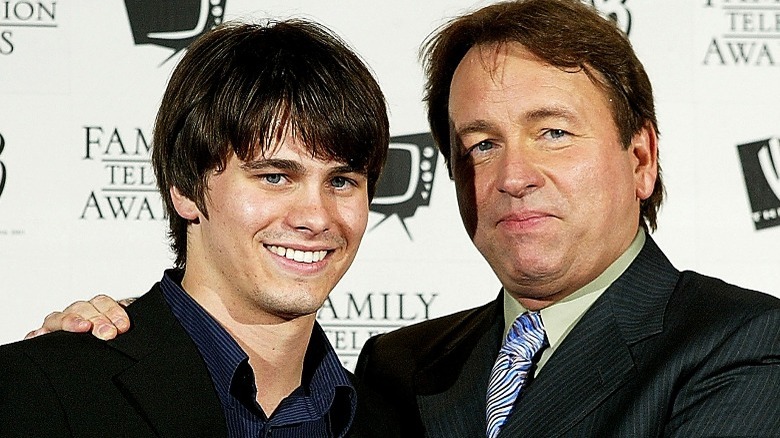John Ritter's Sudden And Tragic 2003 Death Explained
Actor John Ritter rose to fame on the hit sitcom "Three's Company" in the 1970s. He played Jack Tripper, a man who pretended to be gay so that his landlord would allow him to live with two female roommates. It may seem like a dated concept now, but it was a scandalous premise at the time. Critics weren't impressive with the show, but audiences loved Ritter in the role. He received three Emmy Award nominations for his work, taking home the Emmy in 1984 for outstanding lead actor in a comedy series.
Ritter went on to star in such shows as "Hooperman" in the late 1980s and "Hearts Afire" in the 1990s (per IMDb). Ritter also landed some memorable movie roles in "Problem Child" (1990) and "Sling Blade" (1996). And it seemed that he had another successful series on his hands with a new sitcom, "8 Simple Rules ... for Dating My Teenage Daughter," which debuted in 2002. Sadly, this show would prove to be his final foray into television comedy. Tragedy struck as Ritter was working on the show's second season.
Ritter was on set when he got sick
According to People magazine, Ritter was in a good mood when he first arrived on the set of his TV show on September 11, 2003. It was his daughter Stella's fifth birthday, and the latest episode he was working on featured a guest appearance by his friend Henry Winkler. But only a few hours later, Ritter was feeling extremely tired and nauseous. He went to his dressing room to lie down, and some thought he might have the stomach flu. But his condition continued to worsen, and he was advised to go to the hospital by the doctor on staff for the studio.
Ritter was driven to the emergency room at Providence St. Joseph Medical Center. Once there, he was treated for what was believed to be a heart attack (via the Los Angeles Times). Ritter was given anticoagulants, which act as a blood thinner to prevent blood clots from forming, as part of his treatment. But his health only got worse, and the use of this medication may have hampered rather than helped the star once his true ailment was discovered.
Ritter received wrong diagnosis
The doctors eventually learned that Ritter wasn't having a heart attack; he was experiencing an aortic dissection. This meant there was some type of tear in the layers of his aorta, which is the main blood vessel for transporting blood from the heart to the rest of the body (via WebMD). The blood escaping the wall of the aorta may weaken the structure of the blood vessel and cause it to rupture. Pain is the most common symptom of an aortic dissection, as well as numbness and swelling.
Without prompt treatment, an aortic dissection can be fatal. And in Ritter's case, his aortic dissection wasn't discovered until he was undergoing a cardiac catheterization, per the Los Angeles Times. By this time, the new diagnosis came too late to save the actor's life. Ritter died at 10:48 p.m. on September 11 at the age of 54. In addition to his daughter Stella, Ritter was survived by his second wife, actress Amy Yasbeck (shown above with Ritter), and his three children from his first marriage.
Ritter's family launched lawsuits
Many questions arose for Ritter's family (including son Jason, shown with John, above) after the actor's death in regards to the care he received at the hospital (via the Los Angeles Times). They wondered if his death could have been prevented if he had been diagnosed sooner. His widow and his four children decided to seek legal action for what they believed to be a wrongful death. They were concerned that Ritter had failed to receive a chest X-ray that was ordered for him that could have let doctors know about the aortic dissection and other perceived medical mishaps.
Ritter's family received a $9.4 million settlement from the hospital itself, per the Los Angeles Times. The other defendants in the case also settled with the family as well. In 2008, two of the doctors sued in connection with the case were later found not guilty of negligence (via "Today"). To help prevent other families from experiencing the same type of heartbreak, the family established The John Ritter Foundation for Aortic Health. The organization seeks to advance awareness about aortic health issues and support medical research in this area.



